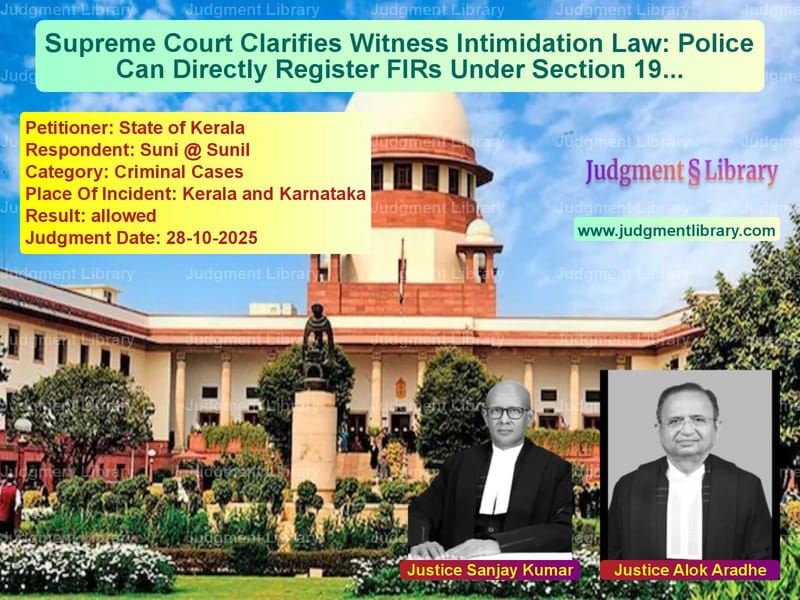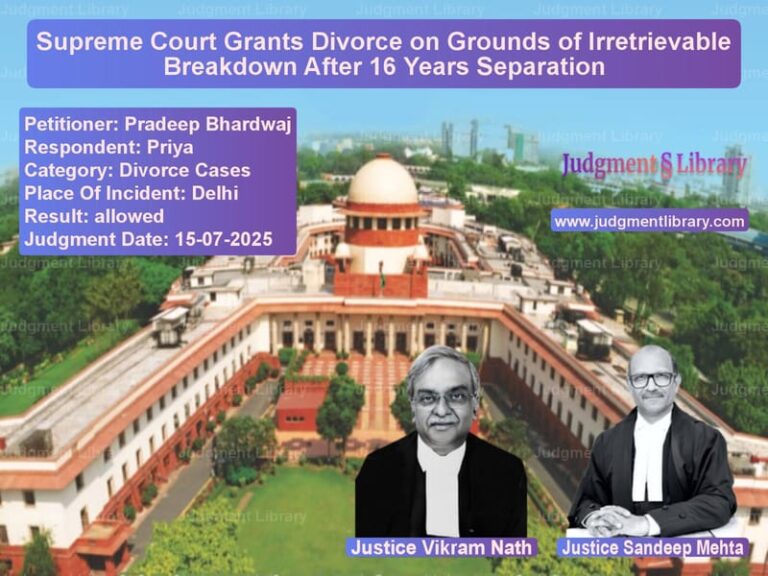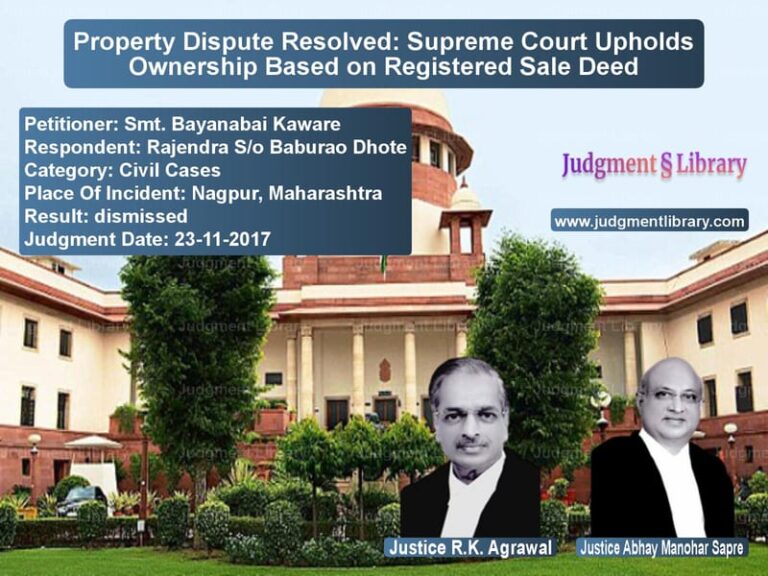Supreme Court Clarifies Witness Intimidation Law: Police Can Directly Register FIRs Under Section 195A IPC
In a landmark judgment that brings clarity to India’s criminal justice system, the Supreme Court has resolved a long-standing legal confusion about how to deal with cases of witness intimidation. The case centered around Section 195A of the Indian Penal Code, which deals with threatening someone to give false evidence, and whether police could directly register FIRs for this offense or if they needed special court permission.
The legal confusion began when Section 195A was added to the Indian Penal Code in 2006. This section states: ‘Whoever threatens another with any injury to his person, reputation or property or to the person or reputation of any one in whom that person is interested, with intent to cause that person to give false evidence shall be punished with imprisonment of either description for a term which may extend to seven years, or with fine, or with both.’ The problem arose because while this new offense was clearly marked as ‘cognizable’ in the law books, meaning police could investigate it without special court orders, it was placed between other offenses that required special court complaints.
The Conflicting Legal Views
Different High Courts across India had taken completely opposite views on this matter. The Delhi High Court in Rahul Yadav vs. State and another had observed that ‘the offence under Section 195A IPC was a cognizable one and, therefore, it was within the power of the police officer concerned to register an FIR.’ Similar views were expressed by the Madhya Pradesh High Court in Abdul Razzak vs. State of M.P. and another and the Calcutta High Court in Honmath Niroula vs. State of West Bengal.
However, the Gauhati High Court in Neput Rajiyung vs. State of Assam and another took the opposite position, opining that ‘prosecution under Section 195A IPC can be launched by a witness or any other person only by way of a complaint before a Magistrate and not by way of an FIR before a police officer.’ This conflicting interpretation created a situation where the same offense was treated differently in different states, causing confusion for both law enforcement and victims.
The Cases Before the Supreme Court
The Supreme Court was hearing appeals from two different cases where High Courts had taken the restrictive view. In the first case from Kerala, the Koratty Police Station had registered an FIR under Section 195A IPC where a murder case approver was threatened with dire consequences if he failed to give false evidence. The Kerala High Court granted bail to the accused, holding that the procedure under Section 195(1)(b)(i) CrPC had to be followed, meaning only the court could complain about such offenses.
In the second case from Karnataka, the CBI had investigated the killing of Yogesh Goudar and found that witnesses were intimidated by accused persons, causing them to turn hostile. The CBI brought this to the notice of the Judicial Magistrate, which was treated as a complaint under Section 195A CrPC. However, the Karnataka High Court set aside this proceeding, again holding that the special court procedure under Section 195(1)(b)(i) CrPC was mandatory.
The Legal Arguments
The lawyers for the accused persons made several arguments to support the restrictive interpretation. The learned senior counsel appearing for the accused argued that ‘the offence under Section 195A IPC should be split up into two. His argument requires the provision to be interpreted in such a manner as to create two categories of offences, that is, if the offence under Section 195A IPC is committed in or in relation to a proceeding before the Court, then the complaint would have to be made by the Court under Section 195(1)(b)(i) CrPC duly following the procedure under Section 340 CrPC. However, if the offence under Section 195A IPC is committed not in, or in relation to, a proceeding before the Court, then Section 195(1)(b)(i) CrPC would not be applicable.’
The Court found no merit in this argument, stating that ‘it practically requires us to rewrite the provision contrary to how it actually reads.’
The Supreme Court’s Analysis
The Supreme Court conducted a detailed analysis of the legal framework. The Court noted that ‘Section 195A IPC was conceptualized as an offence distinct and different from those under Sections 193 IPC, 194 IPC, 195 IPC and 196 IPC. Those offences require a complaint to be made only by those named in Section 195(1)(b)(i) CrPC and they were all non-cognizable offences. However, an offence under Section 195A IPC was a cognizable offence and pertained to inducing a person to give false evidence by intimidating him/her with threat of injury either to his/her person or reputation or property or to the person or reputation of anyone in whom that person is interested.’
The Court explained the practical importance of this distinction: ‘The threat to a witness may be given long before he comes to the Court though the giving of false evidence, under such threat, is in connection with a proceeding before that Court. That is, perhaps, the reason why this offence was made cognizable so that the threatened witness or other person may take immediate steps by either giving oral information of the commission of this cognizable offence to the concerned police officer, under Section 154 CrPC, or by making a complaint to a jurisdictional Magistrate, under Section 195A CrPC, so as to set the process of criminal law in motion. Requiring that person to go before the Court concerned, i.e., the Court in which the proceeding is pending in relation to which false evidence is to be given, and inform it about the threat received, thereby necessitating a complaint under Section 195(1)(b)(i) along with an inquiry under Section 340 CrPC, would only cripple and hamper the process.’
The Court’s Final Ruling
In its final ruling, the Supreme Court made several important observations. The Court stated that ‘Section 195A CrPC, therefore, aimed at bringing clarity to the issue. The threatened witness or other person could approach the police or file a complaint in relation to an offence under Section 195A IPC so that the process relating to cognizable offences could commence immediately. The use of the word ‘may’ in Section 195A CrPC indicates that it is not compulsory for a threatened witness or other person to only approach the Magistrate concerned to complain of the offence under Section 195A IPC.’
The Court further elaborated that ‘the undeniable fact remains that the offence under Section 195A IPC is a cognizable offence and once that is so, the power of the police to take action in relation thereto under Sections 154 CrPC and 156 CrPC cannot be doubted. As the said offence is classified as a cognizable offence, the process of criminal law can as well be set in motion by giving information of the commission of such offence to the concerned police officer under Section 154 CrPC. It is only by way of an additional remedy that Section 195A CrPC permits the threatened witness or any other person acting on his behalf to file a complaint before the jurisdictional Magistrate to set the process of criminal law in motion.’
Impact of the Judgment
As a result of this judgment, the Supreme Court set aside the orders of both the Kerala and Karnataka High Courts. The bail granted to accused Suni @ Sunil in the Kerala case was canceled, and he was directed to surrender before the Trial Court within two weeks. However, the Court clarified that since ‘bail was granted to him only on the limited ground of the procedure under Section 195(1)(b)(i) CrPC not being followed, which we have held to be incorrect, this order shall not preclude him from seeking bail afresh on other grounds, if warranted.’
In the Karnataka case, the cognizance order passed by the Judicial Magistrate was restored, meaning the case against the accused for witness intimidation can now proceed. This judgment brings much-needed clarity to the legal framework surrounding witness protection and intimidation cases, ensuring that victims can approach police directly for immediate protection and action without having to go through the additional step of getting court permission first.
The Supreme Court’s decision strengthens the framework for witness protection in India by ensuring that threats against witnesses can be addressed promptly through regular police channels. This is particularly important in a country where witness intimidation has been a significant problem, often leading to the collapse of criminal cases as witnesses turn hostile due to threats and coercion. The judgment recognizes the practical realities of witness intimidation and creates a more responsive system for dealing with this serious offense.
Petitioner Name: State of Kerala.Respondent Name: Suni @ Sunil.Judgment By: Justice Sanjay Kumar, Justice Alok Aradhe.Place Of Incident: Kerala and Karnataka.Judgment Date: 28-10-2025.Result: allowed.
Don’t miss out on the full details! Download the complete judgment in PDF format below and gain valuable insights instantly!
Download Judgment: state-of-kerala-vs-suni-@-sunil-supreme-court-of-india-judgment-dated-28-10-2025.pdf
Directly Download Judgment: Directly download this Judgment
See all petitions in Bail and Anticipatory Bail
See all petitions in Fraud and Forgery
See all petitions in Extortion and Blackmail
See all petitions in Attempt to Murder Cases
See all petitions in Contempt Of Court cases
See all petitions in Judgment by Sanjay Kumar
See all petitions in Judgment by Alok Aradhe
See all petitions in allowed
See all petitions in supreme court of India judgments October 2025
See all petitions in 2025 judgments
See all posts in Criminal Cases Category
See all allowed petitions in Criminal Cases Category
See all Dismissed petitions in Criminal Cases Category
See all partially allowed petitions in Criminal Cases Category







